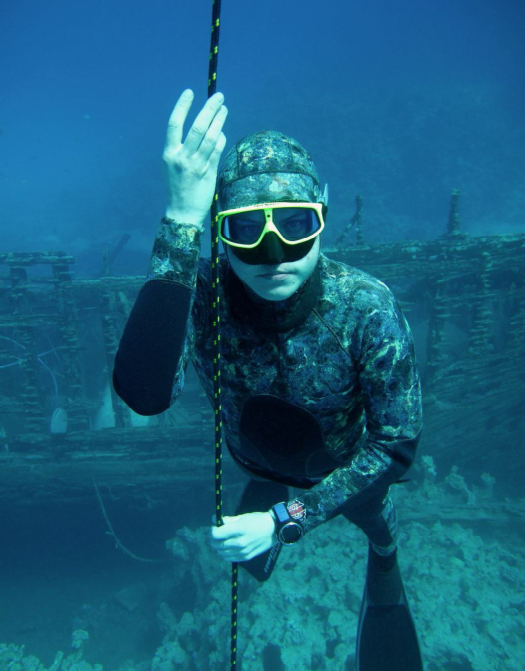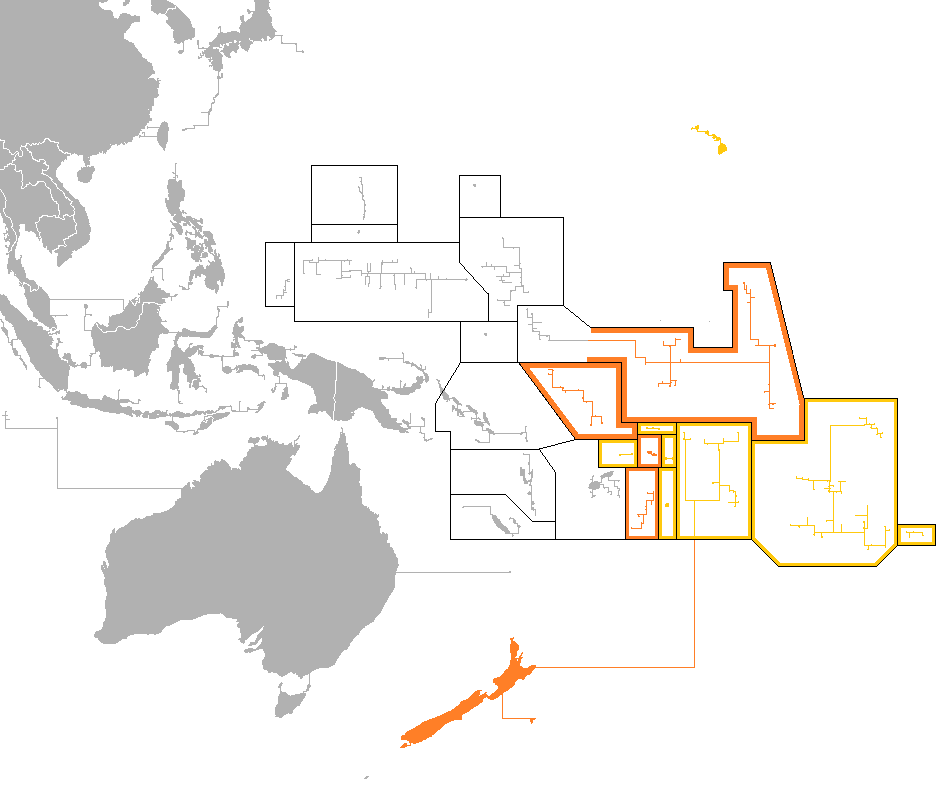|
Taravana
Taravana, or Taravana syndrome is a disease originally recorded among Polynesian island natives and also found among others who habitually dive deep without breathing apparatus many times in close succession, usually for food or pearls. These free-divers may make 40 to 60 dives a day, each of 30 or 40 metres (100 to 140 feet). Classification Taravana appears to be a form of neurological decompression sickness. The usual symptoms are vertigo, nausea, lethargy, paralysis and death. Scans have confirmed that injury is to the brain. Presentation Presentation is usually rapid onset of partial paralysis, visual and hearing problems and difficulties with speech. Occasionally loss of consciousness or death have been recorded. Causes and mechanism Taravana is defined as a consequence of multiple repetitive relatively deep breathhold dives, and is considered likely to be due to the formation of nitrogen bubbles in the central nervous system or in the blood, later lodging in the CNS. A ... [...More Info...] [...Related Items...] OR: [Wikipedia] [Google] [Baidu] |
Free-diving
Freediving, free-diving, free diving, breath-hold diving, or skin diving, is a mode of underwater diving that relies on apnea, breath-holding until resurfacing rather than the use of breathing apparatus such as scuba set, scuba gear. Besides the limits of Apnea, breath-hold, immersion in water and exposure to high ambient pressure also have physiological effects that limit the depths and duration possible in freediving. Examples of freediving activities are artisanal fishing, traditional fishing techniques, competitive and non-competitive freediving, competitive and non-competitive spearfishing and freediving photography, synchronised swimming, underwater football, underwater rugby, underwater hockey, underwater target shooting and snorkeling. There are also a range of "competitive apnea" disciplines; in which competitors attempt to attain great depths, times, or distances on a single breath. Historically, the term ''free diving'' was also used to refer to scuba diving, due to th ... [...More Info...] [...Related Items...] OR: [Wikipedia] [Google] [Baidu] |
Decompression Sickness
Decompression sickness (DCS; also called divers' disease, the bends, aerobullosis, and caisson disease) is a medical condition caused by dissolved gases emerging from Solution (chemistry), solution as bubbles inside the body tissues during Decompression (diving), decompression. DCS most commonly occurs during or soon after a decompression ascent from underwater diving, but can also result from other causes of depressurisation, such as emerging from a Caisson (engineering), caisson, decompression from Saturation diving, saturation, flying in an Cabin pressurization, unpressurised aircraft at high altitude, and extravehicular activity from spacecraft. DCS and Air embolism, arterial gas embolism are collectively referred to as decompression illness. Since bubbles can form in or migrate to any part of the body, DCS can produce many symptoms, and its effects may vary from joint pain and rashes to paralysis and death. DCS often causes air bubbles to settle in major joints like knee ... [...More Info...] [...Related Items...] OR: [Wikipedia] [Google] [Baidu] |
Polynesia
Polynesia ( , ) is a subregion of Oceania, made up of more than 1,000 islands scattered over the central and southern Pacific Ocean. The indigenous people who inhabit the islands of Polynesia are called Polynesians. They have many things in common, including Polynesian languages, linguistic relations, Polynesian culture, cultural practices, and Tradition, traditional beliefs. In centuries past, they had a strong shared tradition of sailing and Polynesian navigation, using stars to navigate at night. The term was first used in 1756 by the French writer Charles de Brosses, who originally applied it to all the list of islands in the Pacific Ocean, islands of the Pacific. In 1831, Jules Dumont d'Urville proposed a narrower definition during a lecture at the Société de Géographie of Paris. By tradition, the islands located in the South Seas, southern Pacific have also often been called the South Sea Islands, and their inhabitants have been called South Sea Islanders. The Hawai ... [...More Info...] [...Related Items...] OR: [Wikipedia] [Google] [Baidu] |
Pearl
A pearl is a hard, glistening object produced within the soft tissue (specifically the mantle (mollusc), mantle) of a living Exoskeleton, shelled mollusk or another animal, such as fossil conulariids. Just like the shell of a mollusk, a pearl is composed of calcium carbonate (mainly aragonite or a mixture of aragonite and calcite) in minute crystalline form, which has deposited in concentric layers. More commercially valuable pearls are perfectly round and smooth, but many other shapes, known as baroque pearls, can occur. The finest quality of natural pearls have been highly valued as gemstones and objects of beauty for many centuries. Because of this, ''pearl'' has become a metaphor for something rare, fine, admirable, and valuable. The most valuable pearls occur spontaneously in the wild but are extremely rare. These wild pearls are referred to as ''natural'' pearls. ''Cultured'' or ''farmed'' pearls from Pinctada, pearl oysters and freshwater mussels make up the majority o ... [...More Info...] [...Related Items...] OR: [Wikipedia] [Google] [Baidu] |
Vertigo (medical)
Vertigo is a condition in which a person has the sensation that they are moving, or that objects around them are moving, when they are not. Often it feels like a spinning or swaying movement. It may be associated with nausea, vomiting, perspiration, or difficulties walking. It is typically worse when the head is moved. Vertigo is the most common type of dizziness. The most common disorders that result in vertigo are benign paroxysmal positional vertigo (BPPV), Ménière's disease, and vestibular neuritis. Less common causes include stroke, brain tumors, brain injury, multiple sclerosis, migraines, trauma, and uneven pressures between the middle ears. Physiologic vertigo may occur following being exposed to motion for a prolonged period such as when on a ship or simply following spinning with the eyes closed. Other causes may include toxin exposures such as to carbon monoxide, alcohol, or aspirin. Vertigo typically indicates a problem in a part of the vestibular system. ... [...More Info...] [...Related Items...] OR: [Wikipedia] [Google] [Baidu] |
Nausea
Nausea is a diffuse sensation of unease and discomfort, sometimes perceived as an urge to vomit. It can be a debilitating symptom if prolonged and has been described as placing discomfort on the chest, abdomen, or back of the throat. Over 30 definitions of nausea were proposed in a 2011 book on the topic. Nausea is a non-specific symptom, which means that it has many possible causes. Some common causes of nausea are gastroenteritis and other gastrointestinal disorders, food poisoning, motion sickness, dizziness, migraine, fainting, low blood sugar, anxiety, hyperthermia, dehydration and lack of sleep. Nausea is a side effect of many medications including chemotherapy, or morning sickness in early pregnancy. Nausea may also be caused by disgust and depression. Medications taken to prevent and treat nausea and vomiting are called antiemetics. The most commonly prescribed antiemetics in the US are promethazine, metoclopramide, and the newer ondansetron. The word na ... [...More Info...] [...Related Items...] OR: [Wikipedia] [Google] [Baidu] |
Lethargy
Lethargy is a state of tiredness, sleepiness, weariness, fatigue, sluggishness, or lack of energy. It can be accompanied by depression, decreased motivation, or apathy. Lethargy can be a normal response to inadequate sleep, overexertion, overworking, stress, lack of exercise, improper nutrition, drug abuse, boredom, or a symptom of an underlying illness or disorder. It may also be a side effect of medication or caused by an interaction between medications or medication(s) and alcohol. It may also be an altered level of consciousness. When part of a normal response, lethargy often resolves with rest, adequate sleep, decreased stress, physical exercise, and good nutrition. Its symptoms, however, can last days or even months, so it can be a sign of a recent underlying illness or infection if it does not resolve normally. See also * Clinical depression * Disorders of diminished motivation * Encephalitis lethargica * Sleep apnea * Sleep deprivation * Somnolence Somnolence ( ... [...More Info...] [...Related Items...] OR: [Wikipedia] [Google] [Baidu] |
Paralysis
Paralysis (: paralyses; also known as plegia) is a loss of Motor skill, motor function in one or more Skeletal muscle, muscles. Paralysis can also be accompanied by a loss of feeling (sensory loss) in the affected area if there is sensory damage. In the United States, roughly 1 in 50 people have been diagnosed with some form of permanent or transient paralysis. The word "paralysis" derives from the Greek language, Greek παράλυσις, meaning "disabling of the nerves" from παρά (''para'') meaning "beside, by" and λύσις (''lysis'') meaning "making loose". A paralysis accompanied by involuntary tremors is usually called "palsy". Causes Paralysis is most often caused by damage in the nervous system, especially the spinal cord. Other major causes are stroke, Physical trauma, trauma with nerve injury, poliomyelitis, cerebral palsy, peripheral neuropathy, Parkinson's disease, ALS, botulism, spina bifida, multiple sclerosis and Guillain–Barré syndrome. Incidents th ... [...More Info...] [...Related Items...] OR: [Wikipedia] [Google] [Baidu] |
Death
Death is the end of life; the irreversible cessation of all biological functions that sustain a living organism. Death eventually and inevitably occurs in all organisms. The remains of a former organism normally begin to decompose shortly after death. Some organisms, such as '' Turritopsis dohrnii'', are biologically immortal; however, they can still die from means other than aging. Death is generally applied to whole organisms; the equivalent for individual components of an organism, such as cells or tissues, is necrosis. Something that is not considered an organism, such as a virus, can be physically destroyed but is not said ''to die'', as a virus is not considered alive in the first place. As of the early 21st century, 56 million people die per year. The most common reason is aging, followed by cardiovascular disease, which is a disease that affects the heart or blood vessels. As of 2022, an estimated total of almost 110 billion humans have died, or rou ... [...More Info...] [...Related Items...] OR: [Wikipedia] [Google] [Baidu] |
Tuamotuan Language
Tuamotuan, Paumotu or Paumotu (Tuamotuan: ' or ') is a Polynesian language spoken by 4,000 people in the Tuamotu archipelago, with an additional 2,000 speakers in Tahiti. The Pa‘umotu people today refer to their islands as Tuamotu while referring to themselves and their language as Pa‘umotu (or Paumotu). Pa‘umotu is one of six Polynesian languages spoken in French Polynesia, the other five languages being Tahitian, Marquesan, Mangarevan, Rapa, and Austral. The Pa‘umotu alphabet is based on the Latin script. About the language History and culture Little is known regarding the early history of the Tuamotus. It is believed that they were settled c. 700 AD by people from the Society Islands. Europeans first arrived in the islands in 1521, when Ferdinand Magellan reached them while sailing across the Pacific Ocean. Subsequent explorers visited the islands over the centuries, including Thor Heyerdahl, the famous Norwegian ethnographer who sailed the Kon-Tiki expedi ... [...More Info...] [...Related Items...] OR: [Wikipedia] [Google] [Baidu] |
Tuamotu Islands
The Tuamotu Archipelago or the Tuamotu Islands (, officially ) are a French Polynesian chain of just under 80 islands and atolls in the southern Pacific Ocean. They constitute the largest chain of atolls in the world, extending (from northwest to southeast) over an area roughly the size of Western Europe. Their combined land area is . This archipelago's major islands are Rangiroa, Anaa, Fakarava, Hao and Makemo. The Tuamotus have approximately 16,000 inhabitants. The islands were initially settled by Polynesians, and modern Tuamotuans have inherited from them a shared culture and the Tuamotuan language. The Tuamotus are a French overseas collectivity. History The early history of the Tuamotu islands is generally unknown. Archaeological findings suggest that the western Tuamotus were settled from the Society Islands as early as 900 CE or as late as 1200 CE. DNA evidence suggests that they were settled about 1110 CE. On the islands of Rangiroa, Manihi and Mataiva, there ar ... [...More Info...] [...Related Items...] OR: [Wikipedia] [Google] [Baidu] |
Oxygen Administration
Oxygen therapy, also referred to as supplemental oxygen, is the use of oxygen as medical therapy, medical treatment. Supplemental oxygen can also refer to the use of oxygen enriched air at altitude. Acute indications for therapy include hypoxemia (low blood oxygen levels), carbon monoxide toxicity and cluster headache. It may also be prophylactically given to maintain blood oxygen levels during the induction of anesthesia. Oxygen therapy is often useful in chronic hypoxemia caused by conditions such as severe COPD or cystic fibrosis. Oxygen can be delivered via nasal cannula, Oxygen mask, face mask, or endotracheal intubation at normal atmospheric pressure, or in a hyperbaric oxygen, hyperbaric chamber. It can also be given through bypassing the airway, such as in Extracorporeal membrane oxygenation, ECMO therapy. Oxygen is required for normal cell metabolism, cellular metabolism. However, excessively high concentrations can result in oxygen toxicity, leading to lung damage and ... [...More Info...] [...Related Items...] OR: [Wikipedia] [Google] [Baidu] |




